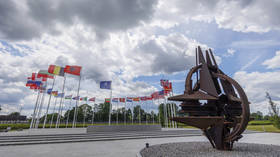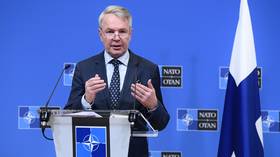NATO comments on nuclear guarantees for Russia

NATO is not inclined to give Russia any security guarantees on the deployment of nuclear weapons on the territories of its two newest prospective members, Finland and Sweden, the bloc's Deputy Secretary-General Camille Grand has said.
“Every country is free in the nuclear field to deploy or not to deploy such weapons. We are not talking about setting up some principle restrictions on the possible actions of the alliance,” the NATO official told Swiss broadcaster RTS in an interview published on Tuesday.
Every NATO member-country decides this issue sovereignly. And now there is no such question. But I do not think that in the current situation it is necessary to give Russia any guarantees regarding our military posture in the region.
Longtime neutral countries, Finland and Sweden have scrambled to join NATO amid the ongoing conflict between Russia and Ukraine. Russia attacked its neighboring state in late February, following Ukraine’s failure to implement the terms of the Minsk agreements, first signed in 2014, and Moscow’s eventual recognition of the Donbass republics of Donetsk and Lugansk. The German- and French-brokered protocols were designed to give the breakaway regions special status within the Ukrainian state.
The Kremlin has since demanded that Ukraine officially declare itself a neutral country that will never join NATO. Grand said that the potential accession of Ukraine to the bloc is currently not on the agenda, and the ongoing conflict must be resolved before Kiev “will be able to decide for themselves how they want to position themselves in the European security architecture.”
Both Finland and Sweden, despite being de jure neutral, have maintained close ties and military cooperation with the US-led bloc for decades. “These are two very close partners who come with significant military capabilities. They also bring knowledge of the Baltic and Nordic Seas region,” Grand said.
The potential accession of the two nations to the bloc, however, has run into a deadlock as Turkey, a major NATO country, firmly opposes their membership bid. Ankara accused the two countries of being “guesthouses for terrorist organizations” for hosting members of outlawed Kurdish groups. Turkey now wants Helsinki and Stockholm to clamp down on the Kurdistan Workers’ Party (PKK) and other groups it deems terrorists, as well as to surrender some suspects to Ankara. Among other demands, Ankara also wants the two countries to lift restrictions on arms trade with Turkey.
Grand expressed hope that the differences between Turkey and the two prospective member states will be resolved ahead of the upcoming NATO summit scheduled for late June.
“We are hopeful that the differences will be settled in time for the summit. It is important to take Turkey’s concerns into account,” Grand stated.













